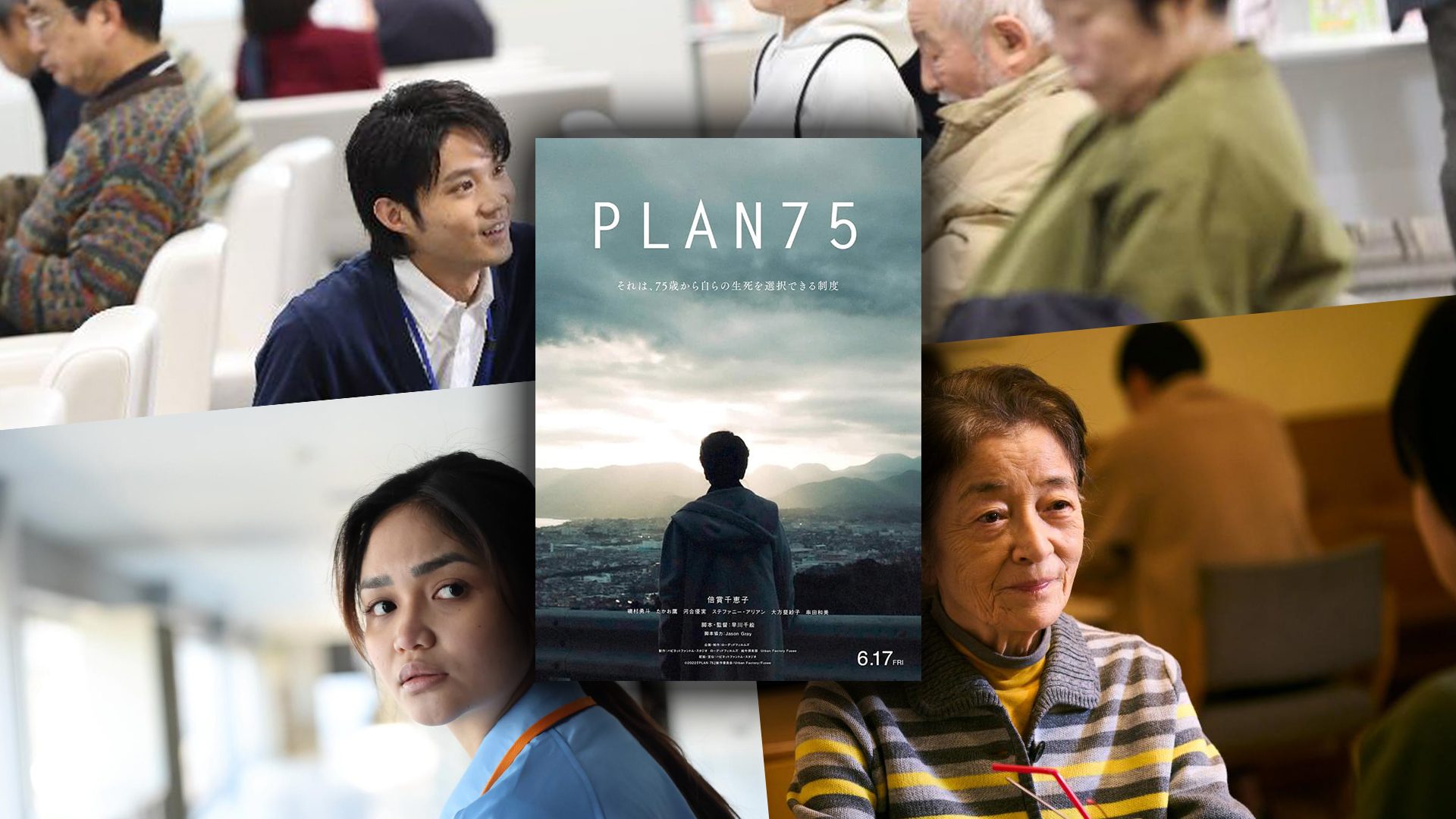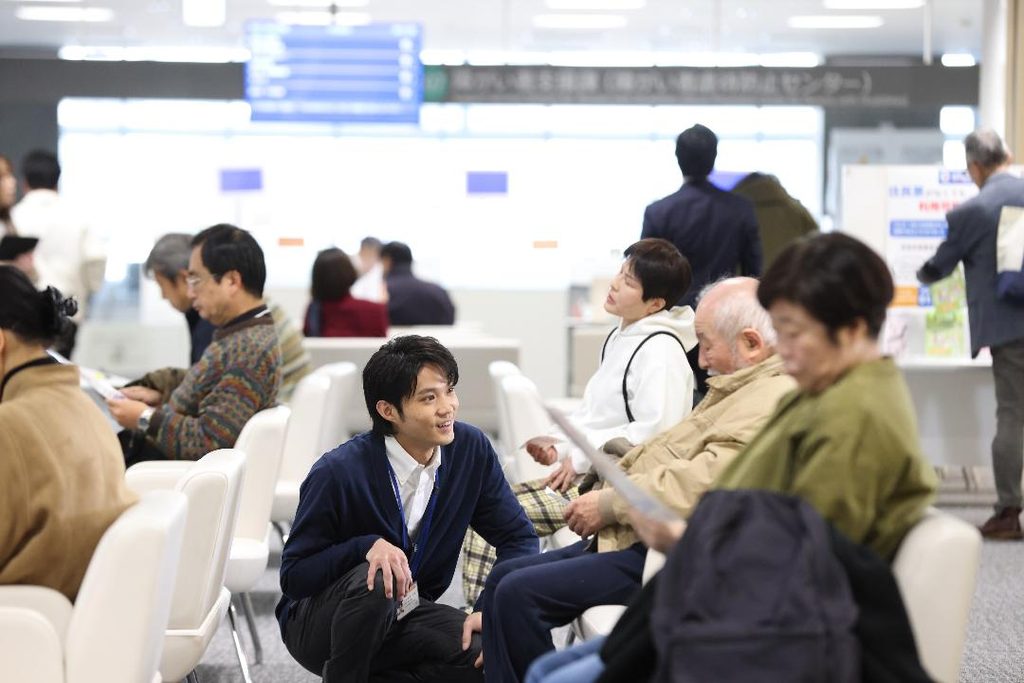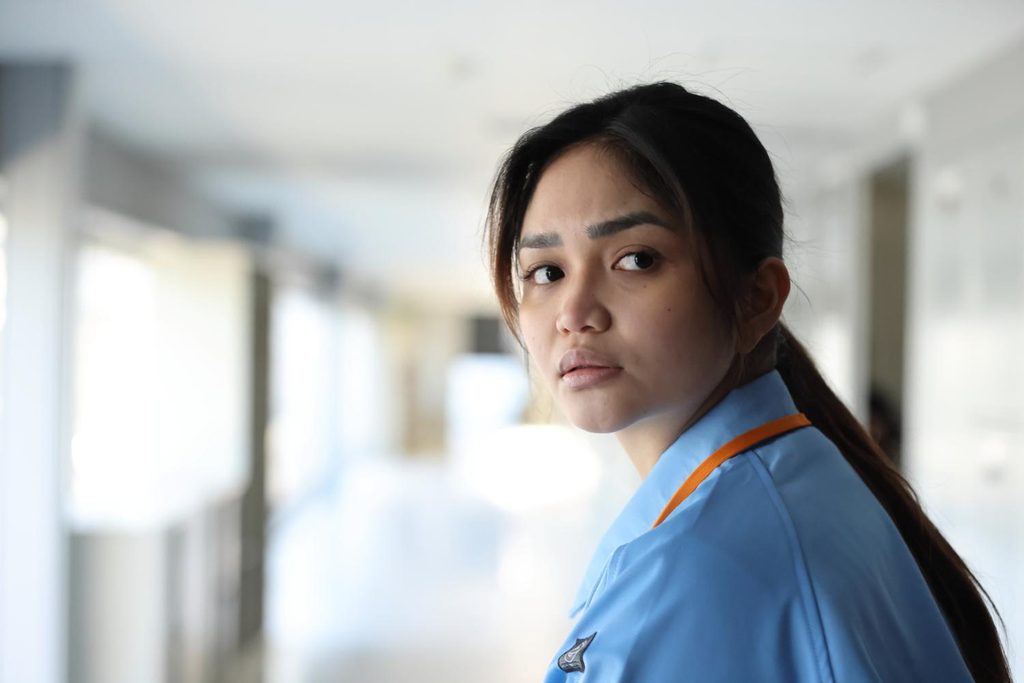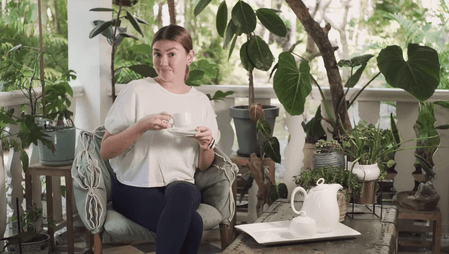
[Only IN Hollywood] Film with ‘strong Filipino character’ competes in Cannes
CANNES, France – Plan 75, a Japan-Philippines-France co-production with “a strong Filipino character,” competes here in the 75th Cannes Film Festival.
Japanese filmmaker Chie Hayakawa’s feature directing debut, which she also wrote, is entered in Un Certain Regard, a section of the world’s most prestigious film festival, which opened Tuesday, May 17.

The drama, whose key figures include Filipinos Alemberg Ang (co-producer) and Wilfredo Manalang (executive producer), imagines a time when Japan implements a government program, Plan 75, that encourages its elderly folks to be euthanized to remedy an aged society.
The plot revolves around a senior woman (veteran actress Chieko Baisho of Howl’s Moving Castle), whose means of survival are disappearing, a pragmatic Plan 75 salesman (Hayato Isomura), and a Filipina caregiver (Stefanie Arianne) who face a choice of life or death. The film also stars Taka Takao and Yumi Kawai.
Before leaving for Cannes, I interviewed via email Chie, Alemberg, Wilfredo (who is also known as Will Fredo), Stefanie, and Sheryl Ichikawa, another Filipino actress in the film.
Chie Hayakawa
Asked what inspired Chie to include a Filipino caregiver in the story, she answered, “There are so many foreign caregivers coming to Japan because of labor shortage, especially in the field of elderly nursing homes.”
“The Philippines is one of the biggest countries to provide caregivers to Japan. The reason why I chose a Filipino caregiver is because I have an impression that Filipino people have strong family and community bonds that we Japanese are losing.”
“They have a spirit of helping each other that may be rooted in their religion or cultural background. I feel that they have a national characteristic of affection and philanthropism.”

“I wanted to contrast the warm Filipino community with the apathetic community in Japan. I also wanted to include the eyes of a foreigner who looks at Japanese society objectively.”
On why she cast Japan-based Pinay actress Stefanie, Chie replied, “She is a very affable and brave person. Her gaze and presence made a strong impression on me.”
“Maria is a character who is so determined to live for herself and her daughter. Stefanie’s down-to-earth presence breathes life into Maria.”
“She often gave me ideas during the shoot that helped me a lot. I really appreciated it. I am very proud of her.”
The filmmaker, who made several shorts before Plan 75, shared how she heard the news that her first feature movie was going to the famed festival on the Croisette.
“I was working on the post-production in Paris for two months,” Chie began. “It was the last day of my stay. I was really rushing. I concentrated on finishing sound in the studio.”
“When Philippe, our sound designer, and I finished the work and started to export the file, I heard an exultant shout from the office upstairs. Immediately after, Frédéric, our executive producer, knocked on the door and told us, ‘We’re in Cannes!’ It was a happy moment I will never forget.”
“Cannes was my first film festival experience, when my short film (Niagara) was selected for Cinefondation in 2014. I am very pleased to be there again with my first feature.”
The Tokyo-born writer-director talked about the genesis of Plan 75. “In the summer of 2016, a man murdered 19 disabled people, purporting that severely disabled people have no worth staying alive and that his deed was an act of mercy.”
“In his letter describing his motive, he used the words, ‘vitalization of the world economy.’ His logic was that the existence of disabled people hinders economic activity and that economic value is more important than human lives.”

“I don’t believe that this way of thinking is confined to one deranged murderer. In our society where economic value is prized over everything else, I cannot help thinking that there are, in fact, many people who share similar emotions.”
“Our capitalist society, which values rationality and productivity, creates the distinction between ‘worthy lives’ and ‘worthless lives.’ And critical views on socially weak people get stronger by the day. My anger and anxiety toward such intolerance of society motivated me to make this film.”
Alemberg Ang and Wilfredo Manalang
Alemberg, whose many producing credits include Loy Arcenas’ Ang Larawan (The Portrait), recounted how the Japanese-Filipino-French co-production come about.
“I was attending Focus Asia, the industry section of the Udine Far East Film Festival, pitching another project when I was introduced to Eiko and Jason Gray. They were working on a Japanese film with Filipino elements and someone in Focus Asia introduced me to them.”
“Jason was hoping that perhaps I can help them with it. That basically started my involvement in the project.”
“I met Chie when I participated at Talents Tokyo in 2014. Talents Tokyo is a training initiative for Asian producers and directors. It’s affiliated with Berlinale Talents. She was also a participant there.”
Alemberg shared how he tapped Wilfredo as one of the producers. In addition to Alemberg and Wilfredo, the other producers are Jason Gray, Eiko Mizuno Gray, Frederic Corvez and Maeva Savinien.

“I remember writing to Will, telling him how happy I am how his projects have been steadily taking off,” Alemberg recalled. “That eventually led to a conversation about what he was currently [doing].”
“Will just left ABS-CBN’s international division and was starting his own company. That’s when I started pitching the projects that I was working on with him.”
Wilfredo, for his part, said, “When Alemberg approached me with his slate of projects, I immediately gravitated to the premise of Plan 75.”
“The struggles of the characters in the dystopian world, the politics underlying the subject matter, and the inclusion of a Filipino story in the mix were some of the elements that hooked me. Plus, I have a soft spot for and fascination with Japanese culture.”
“Somehow, the timing was perfect. I’ve been setting up FUSEE with my partners, Alicia Watt and George Sommerrock, when this project fell into my lap.”
“As a creative content company, our goal is to uplift and bring Filipinx representation into the forefront. Plan 75 is the perfect first project for us, given the strong Filipino character in it and Maria’s story touches on the fundamental issues Filipino families go through on a daily basis.”
“I’m hoping we can do more international co-productions in the future. We’re just starting.”
“We have a couple of things in the pipeline that’s in development. And I’m excited for Cinemalaya Film Festival 2022. Our project, Blue Room, by Ma-an Asuncion-Dagnalan, another feature film debut by a female director, will have its premiere.”
Wilfredo bared how Stefanie was cast. Plan 75 follows another high profile Japanese film, Ryusuke Hamaguchi’s Oscar and Golden Globe winning film, Drive My Car, which also features a Filipino actor, Perry Dizon.
“We actually did a full-on virtual audition and casting, given the COVID pandemic,” Wilfredo said. “We presented to our director Chie Hayakawa and our Japan counterparts some of the established actresses in the country who might fit the role.”
“The list got narrowed down and we set up Zoom auditions. I’m not exaggerating, but believe me, it was a difficult process since we have a really good pool of seasoned actors.”
Alemberg added, “Our Japanese partners were blown away by the talent we have in the Philippines and how, given such a short amount of time, our actresses were able to learn the Japanese parts of our audition pieces.”
“Not only did they sound authentic but they were also acting, giving really heightened emotions while delivering lines in Japanese.”
Wilfredo said, “When things got to the wire, the tight schedule for the production shoot in December-January was a bit problematic, given the schedule conflicts and the Philippine holidays.”
“Once we had the actor ready and prepped, the Omicron surge blew up and Japan locked down, preventing us from flying the actor.”
Alemberg shared, “We were doing everything here in Manila to get a visa for our actress. We sought the assistance of the Film Development Council of the Philippines and the Japan Foundation. But the Japanese government was resolute in closing its borders.”
Wilfredo stressed, “Fate works in mysterious ways. Luckily, our Japan counterpart did auditions for the other Filipino characters in the script and Stefanie Arianne walked into the audition.”

Alemberg remarked, “Will and I were asked to check out a number of potential Filipino actresses and we all gravitated towards Stefanie.”
On the casting of Sheryl Ichikawa, another Filipina actress in the film, Wilfredo commented, “Our Japanese counterpart sent us audition recordings of the cast. The first time I saw Sheryl, I placed her on my list of actors to consider, given her natural style of acting. I’m glad she eventually made the cut and plays an important role in the film.”
“She was very natural and motherly, which suited her role,” added Alemberg.
Wilfredo and Alemberg also talked about how they coached Stefanie on her Filipino accent since she has acquired an Australian accent.
“I immediately noticed Stefanie’s Aussie accent,” said Alemberg. “I even thought she was Filipino-Australian because of it. So I told Chie and our Japanese producers that we need her to work on her accent a little more so that it’s more natural-sounding for a Filipino.
“I started looking for foreign series with Filipino actors so that I can tell them which ones sounded authentic Pinoy and which ones you can tell have a Western accent.”
“I sent those samples to Stefanie and she studied them diligently. She also studied the accents of prominent Filipino actresses.”
“The Japanese team eventually hired a language coach for Stefanie. Since I cannot physically be on set, they patched me via Zoom and Google Meet so I can watch the scenes and comment on Stefanie’s acting and accent.”
“I didn’t want to rattle Stefanie so I avoided talking to her directly. I would give my feedback to both Chie and the acting coach so they will relay it to Chie.”
Wilfredo said, “I worked with Sheryl during the ADR for some of the lines in the script, adjusting some of the accents and delivery to fit what was needed in the scenes.”
“It was a bit difficult, given we were doing all of this via Zoom. Sheryl, together with Eiko and Jason, in a Japan studio; our director, Chie, was in France with our sound engineer; and I was in Seattle coaching Sheryl. It was quite amazing we were able to do it that way.”
Alemberg pointed out, “What’s great working with Will is that he’s a director himself so he works well with actresses.”
I asked Alemberg and Wilfredo, given the strong Filipino tradition of families taking care of their elderly, if they think a program like Plan 75 that’s tackled in the film will even be considered in the future in the Philippines.
“I hope not,” Wilfredo said. “I don’t think it’s in our DNA culturally since we all grew up with elderlies living in our homes. There’s a certain degree that it is expected that children will eventually take care of their parents when they get old.”
“‘Utang na loob sa nakakatanda’ or ‘ang hindi lumingon sa pinanggalingan…’ is something ingrained in our system. But given the changing times and the vulnerability in our country, I hope we keep this good practice in our homes.”
“Population growth could be a problem for countries in the future. Let’s hope we don’t have to resort to Plan 75-ish solutions. It’s a scary thought.”
Alemberg emphasized, “I doubt if euthanasia will be allowed at all in our lifetime. Plus, our culture is inherently respectful towards our elders. Plus, the strong family bonds make it also less likely that something like this will be allowed.”

The former high school literature teacher-turned-producer will be a busy man representing Asian cinema in Cannes.
“I have two other projects that are being presented in Cannes,” Alemberg said. “Ria by first-time filmmaker Arvin Belarmino is part of the Cannes Residency. He is developing his project in France for the past few months and he will be presenting it in Cannes to potential international co-producers.”
“The film is about the punk community and the underground porn industry in the Philippines. Ria is about a young woman’s struggles with inequality and discrimination and her quest to survive eventually leads her to that community to fight for their rights.”
“The second project is by first-time Burmese filmmaker Sein Lyan Tun, titled Beer Girl in Yangoon and produced by Indonesian producer and programmer John Badalu. I’m the Filipino co-producer.”
“The project is presented at the Cannes Cinefondation Atelier. The film is about a teenager who is trying to cope with her activist father’s torture and death at the hand of state authorities while trying to feed herself and her family by working in a sleazy beer house.”
“While fending off the lure of underage prostitution, and dealing with her own sexual awakening, she is caught between a mysterious elderly man and a young co-worker girl as she paves the way to realize her own dreams and aspirations.”
Both Alemberg and Wilfredo have attended Cannes Film Festival before. But this is their first time to participate in the festival with a film that’s in competition.
“I’ve attended Cannes as a delegate and as the executive director of the Film Development Council of the Philippines,” Wilfredo shared. “I got exposed to the nitty-gritty of the festival and the glamor.”
“I watched filmmakers go up the red carpet and proudly screen their films. I’m excited for Chie Hayakawa and the rest of the team. We get to experience this on the other side of the fence this time around. And I’m hoping it’s just the beginning.”
Alemberg pointed out, “It’s really any filmmaker’s dream to have their film premiere at Cannes. I’ve been to Cannes a few times now, mostly to pitch my projects and seek international partners for my films but it is my first time to actually present a film at the festival.”
“I am just so blessed and honored to have this opportunity to work on such a beautiful project by amazingly talented people. Eiko and Jason have been wonderful partners and great collaborators.”
“And from the time I saw Chie’s earlier short film when we first met at Talents Tokyo, I knew how talented she is. I’m just so happy that I was part of the team that made her first feature film a reality.”

Stefanie Arianne
“Yes, it is! I’m beyond thankful and am still in Cloud 9!” Stefanie exclaimed, in response to my comment that Plan 75 marks her first major film role and the movie gets selected to screen in Un Certain Regard.
“I found out while I was out having dinner with my boyfriend. I saw that Mr. Alemberg tagged me on Facebook, saying we got in Cannes.”
“I exclaimed, ‘Oh my God!’ louder than I expected. My boyfriend and the server bringing our dish thought I was just really excited about the food (which I also was).”
“Throughout the dinner, I was just alternately giggling, spacing out, or happily dancing. On the way home, I was just happily crying in the car and screaming my joy on the highway.”
“My boyfriend took candid shots of me during the time I found out.”
On what she looks forward to about attending Cannes as a cast member of a film in competition, Stefanie said, “I honestly don’t know what to expect! This will be my second film festival red carpet and all I hope is that I won’t trip in my heels like in the first one!”
“I’m also very excited to finally meet the Filipino executive producer Wilfredo Manalang and co-producer Alemberg Ang, and the France team. I’m also looking forward to reuniting with the Japan team as well.”
“On top of that, I’m very delighted to get to meet creatives from around the globe. It’s going to be a memorable experience and an honor to represent both Japan and the Philippines.”
“Maria is very dedicated and is a fighter,” Stefanie described her character. “She doesn’t give up easily even if life throws curve balls at her, no matter how big or small.”
“She genuinely cares for the people around her. I relate most with these traits because we both try to find ways to solve a problem while staying strong for ourselves and also our loved ones.”
Stefanie described how Chie guided her in her portrayal of Maria. “Chie is a wonderful director! She’s very easy to talk to. When I have questions or suggestions, she listens to them openly and gives me advice which is a better approach. Her clear instructions and respect for my character’s culture helped me a lot.”

Stefanie recounted her journey as a woman raised in the Philippines who ended up becoming an actress in Japan.
“I’m often mistaken to be Filipino-Australian due to my accent. However, I grew up in the Philippines! I adapted the accent when I worked for a New Zealand company in Tokyo for four years.”
“My journey as an actress in Tokyo consists of a lot of rejection. I’m Japanese-Filipino. I usually don’t fit the certain beauty standards casting is usually looking for.”
“There were times that I’ve almost given up but I always found that tiny spark of hope in me. This has always been my dream as far as I can remember.”
“I can rest but I won’t quit pursuing my passion. These experiences make me appreciate and give my best to any project I book. It’s been a wild but fun ride!”
“And I’m very fortunate to have good people as my support group here in Japan. They help keep me grounded and remind me of what I’m capable of.”
Sheryl Ichikawa
Sheryl offered her take on her role: “Grace is a strong character. I’d call her a ‘fighter mom.’ Like most Filipino moms, she will do everything for her children and she’ll always be ready and willing to help other nanays like her. She has a big heart, always helping everyone.”
“I relate very well to the character as a strong mother. I always give 100% to my family. I’d like to think that I also have a big heart and tries to help everyone. But then I must admit that I’m also human (tao rin po tayo) who also gets hurt.”

“And unlike Grace, I’m not as friendly as she is. I can get a little shy at times. In Japanese this is called ‘hitomishiri‘ (人見知り). Mahiyain po talaga ako. Especially when in front of the camera.”
She enthused about her director: “Direk Chie Hayakawa is a very good director. She has a quiet demeanor.”
“Direk shared with me what she thought about the character of Grace, then she explained to me that she wants her to be a good representation of a Filipina who has been living in Japan for several years now.”
“During the shoot, everyone in the production team was very welcoming. Direk Chie asked me if I have any questions and if there is anything the team can do to make me feel comfortable.”
“I can feel her confidence in me as an actress, which helped me deliver my lines. That’s why I also felt confident that I can do my very best to portray the character of Grace.”
Sheryl shared her journey, going from a dancer in the Philippines’ longest-running noontime show to acting in Japan. “It has always been challenging. I know that I can be easily replaced.”
“I always have to keep my feet on the ground. This is also what I tell my kids.”
“During my teenage years, I acted onstage. Before I started working in Japan when I was 19 years old, my friends asked me to join them when they auditioned for a segment on the TV Show, Eat Bulaga.”
“When I was there, I was also asked to audition. I was surprised they immediately called me to join the show. I won and became a finalist as an EB (Eat Bulaga) Babe. Then I received my ticket to Japan.”
“After a month, I was back in the Philippines and I was cast as an extra for a teleserye. But then I needed to go back to Japan ASAP.”
“I decided to postpone my dream of becoming a singer-actress when I return to the Philippines after my work in Japan. But I fell in love with my husband and we got married.”
“After 10 years, and having three kids, someone approached me with an acting offer last May but I turned it down. I told him that I have already turned my back on becoming an actress.”
“But then I shared this with my husband and that I miss going in front of the camera. After I opened up to my husband, he encouraged me to pursue my dreams, as long I don’t forget about my responsibilities to our family.”
“I then called my manager and we met within that week. I started becoming an extra in a few TV shows like a popular drama series, a variety quiz show, and a movie in Japan. I also got into modeling.”
“It came to a point where clients already know me so I don’t need to audition for the roles anymore, especially if my manager knows that I can do it.”
“Eventually, my kids also started acting here in Japan. My husband would always take us to our sets and pick us up when we’re done.”
“I got to work with different directors and they would recommend me to other directors. Whenever someone is looking for a Filipino actress in Japan, they would recommend me.”
“I worked with Direk Ricky Davao for the Lenten drama special of Eat Bulaga. They shot in Fukuoka. I also worked in a Viva film.”
“I am just thankful for the Lord’s blessings. My shoots have been continuous. I also did voice-over work for NHK.”
“That’s when I received the call to audition for Plan 75. I’m lucky that I got to work with Filipinos, Will and Alemberg.”
“I love acting and I’m happy that I get to work as an actress. Although sometimes, I also feel bad on set. Since we work with different nationalities, people have different personalities.”
“But we just have to get used to this and learn to respect each other. If you show them that you respect them, then they will respect you.”
“I kept auditioning and I was getting a lot of work until the pandemic. I still have pending projects. But I pray that hopefully, we all move forward so we can go back to normal.”
I wish Plan 75 good luck in the 75th Cannes! – Rappler.com

![[Only IN Hollywood] How a Filipino actor landed in Japan’s best foreign language film frontrunner](https://www.rappler.com/tachyon/2022/01/perry-dizon.jpg?fit=449%2C449)
